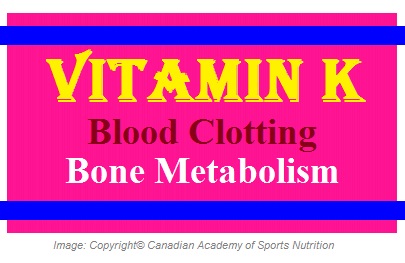Being famous as the “blood clotting vitamin”, vitamin K is a fat soluble  vitamin. There are two natural forms of vitamin K: K1 (also known as phylloquinone, phytomenadione, and phytonadione), and K2 (menaquinone). Vitamin K3 (menadione), K4, and K5 are synthetic forms of the vitamin.
vitamin. There are two natural forms of vitamin K: K1 (also known as phylloquinone, phytomenadione, and phytonadione), and K2 (menaquinone). Vitamin K3 (menadione), K4, and K5 are synthetic forms of the vitamin.
Vitamin K2 has several subtypes with menaquinone – 4 (MK-4) and menaquinone – 7 (MK-7) being the most studied forms.
Functions of Vitamin K:
- Vitamin K has a key role in normal blood clotting.
- It is important for bone metabolism.
Food Sources and Absorption:
Vitamin K1 can be found abundantly in green leafy vegetables, such as kale, dandelion greens, mustard greens, spinach, collard greens, parsley, Swiss chard, turnip greens, broccoli, Brussels sprouts, and vegetable oils.
MK-4 is found in meats, eggs, liver, and dairy products. MK-7 is made by bacteria during fermentation, and is found in fermented soybeans (natto) and fermented cheese. The intestinal bacteria can make vitamin K2, not vitamin K1. Moreover, vitamin K1 can be converted to vitamin K2 in the body as well.
Up to 60% of dietary vitamin K is absorbed with the help of fats and bile from the upper part of the small intestine. Then it is carried to the liver to be used to make clotting factors. Small amounts of vitamin K are stored in the liver and fatty tissues. Calcium and vitamin E may reduce the absorption of vitamin K.
Benefits of Vitamin K: 
The following conditions may benefit from vitamin K:
- Warfarin overdose.
- Osteoporosis (especially MK-7).
- Cystic fibrosis.
- Celiac disease.
- Crohn`s disease.
- Alzheimer’s disease.
- Morning sickness.
- Acute myeloid leukemia (AML) (especially vitamin K2).
- Myelodysplastic syndrome (especially vitamin K2).
- Lymphoma (prevention only).
- Cancers, especially liver and prostate (prevention only).
- Heart disease.
- Topical application for: scars, bruises, stretch marks, burns, rosacea, and spider veins.
Vitamin K Deficiency:
Deficiency of vitamin K is uncommon. The symptoms appear when dietary daily intake of vitamin K drops to below 10 mcg. The main symptoms are bruising and bleeding. Predisposing factors for vitamin K deficiency are:
- Liver disease.
- Malabsorption of fat.
- Antibiotic use.
- Celiac disease.
- Crohn`s disease.
- Bulimia.
- Vitamin E overdose.
- Medications: salicylates, barbiturates, and cefamandole.
- Radiation therapy.
Dosage and Side Effects:
The suggested daily adequate intakes for vitamin K for adults are 120 mcg and 90 mcg for men and women, respectively. Vitamin K1 and K2 are nontoxic and easily stored or eliminated, but the synthetic form (vitamin K3) could build up in the body and cause toxicity.
Symptoms of toxicity may include hemolytic anemia, jaundice, and allergic reactions.
Interactions:
- Warfarin: vitamin K decreases the effectiveness of this medication.
- Barbiturates: they may deplete vitamin K from the body, increasing its demand.
- Aspirin: vitamin K may decrease the blood – thinning effect of aspirin. On the other hand, aspirin decreases blood levels of vitamin K.

